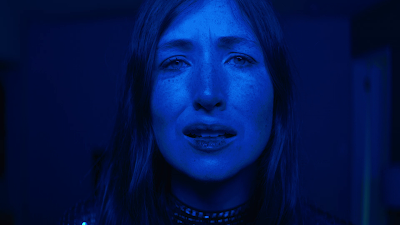Wednesday, 16 September 2020
She Dies Tomorrow
Kate Lyn Sheil's Amy knows she going to die. She's certain of it. She rambles around her newly purchased house, passing over her packed-up possessions to focus on making her final moments elegiac and meaningful. Amy picks at and smooths her finger along driftwood; Mozart spins ceaselessly on her record player. She browses online stores, determined to hit upon a method that will allow her remains to be put to good use. It's all a reach, a straining attempt to organise Amy's final moments in a way that befits the life she has led. That's one reaction to airborne, impending doom. Other characters in Amy Seimetz's She Dies Tomorrow respond in drastically different ways. The film's infection is verbal, a communicable dread that passes along conversational chains before burrowing into a person's psyche, mutating their behaviour.
Beginning with an unseen food service slogger, no doubt pressed into work despite their ailment, She Dies Tomorrow's disease is an unwelcome revelation; a sudden, revolting knowledge accompanied by cycling neon lights. Microscopic asides link the sickness to a shard of glass passing, with great determination, along a blood stream. Like Don McKeller's Last Night, this grim inevitability exacerbates the rougher aspects of human interacting, transforming everyday exchanges into differing kinds of psychosis: dutiful sons hasten to end their sick father's lives and familial disquiet boils over into sloppy attempts at murder. Despite the disease's transmission method, communication stalls in Seimetz's film. There's never a clear consensus regarding the scale of death. Some infectees focus on their own passing; others are convinced that all life, not just human, is to end. Plainly disinterested in resolution, She Dies Tomorrow is happy to simply activate.
Labels:
Amy Seimetz,
Films,
She Dies Tomorrow
Subscribe to:
Post Comments (Atom)


No comments:
Post a Comment